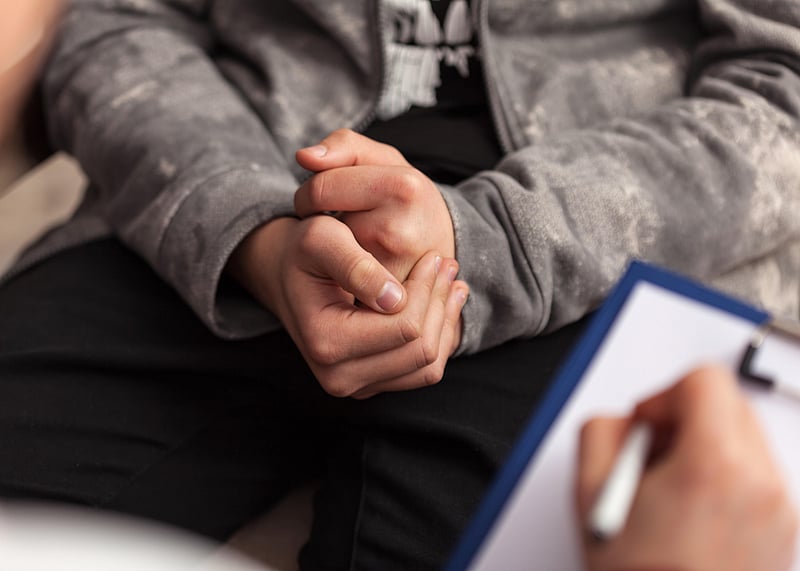Get Healthy!

- Denise Mann
- Posted May 24, 2022
Pandemic Has U.S. Hospitals Overwhelmed With Teens in Mental Crisis
The COVID-19 pandemic and the isolation it imposed took a dramatic toll on kids' mental health, increasing the demand for services in an already overburdened system.
As a result, many kids found themselves being "boarded" in emergency departments as they awaited care, according to a new study conducted at Boston Children's Hospital. The average wait was nearly five days without specialized treatment.
"This is a huge problem nationwide," said Dr. Jennifer Havens. She is a professor and chair of child and adolescent psychiatry at NYU School of Medicine in New York City.
"The demand for mental health services has dramatically increased due to COVID-19, and the capacity for inpatient psychiatric care for kids is marginal at best, so we are seeing a backlog for inpatient and outpatient mental health services," said Havens, who has no ties to the new study.
For the study, Dr. Patricia Ibeziako, associate chief of clinical services in the Boston Children's Hospital department of psychiatry and behavioral sciences, and colleagues compared hospital records from the first year of the pandemic (March 2020 to February 2021) to the year before it.
During this time, nearly 3,800 children aged 4 to 18 were admitted to the emergency department or inpatient units for mental health concerns. About eight in 10 were aged 12 to 18.
In the year before the pandemic, 50% of kids who were admitted to the hospital had suicidal ideation or made suicide attempts. This number rose to 60% during the first year of the pandemic, the study showed.
In addition, there were marked increases in mental health admissions for depression, anxiety, eating disorders, substance abuse, and obsessive-compulsive disorder during the first year of the pandemic.
Growing numbers of kids were housed for days in the emergency department due to mental health problems the first year of the pandemic. The average boarding time increased from 2.1 days pre-pandemic to 4.6 days during the pandemic, the findings showed.
The study was published online recently in Hospital Pediatrics.
There are things that concerned parents can do today to potentially avoid a boarding scenario. "Don't wait until things get bad," said Dr. Meghan Schott, the medical director of psychiatric emergency services at Children's National Hospital in Washington D.C. "Get on a waitlist for care and services as soon as you notice an issue," said Schott, who was not involved in the study.
"Boarding is on the rise because kids are coming in with severe and worsening mental illness," said Schott. "Seeking outpatient services as soon as there is a small hint of a problem can help avoid the need for boarding."
Boarding doesn't address the underlying problem. "If you just sit in the emergency room or on the medical floor, you're not really getting the services you need," she said. If your child needs to be hospitalized for mental health concerns, look for hospitals that have pediatric psychiatric units, Schott added.
The system is broken, and unfortunately, there isn't a quick fix, Havens noted. "We need to increase the workforce and increase reimbursement rates," she said.
"Workforce problems are related to reimbursement because if you don't pay someone a living wage, you can't recruit people," Havens said.
"We pulled intensive care unit beds out of nowhere for COVID-19 patients at the beginning of the pandemic, and suicide is the second leading cause of death among people aged 10 to 24," Havens added. "We really need to figure out how to fix this system."
Your pediatrician has an important role to play in helping kids with mental health issues get the care they need, said Dr. Steven Abelowitz. He's the regional medical director of Coastal Kids Pediatrics in Irvine, Calif.
"If the pediatrician gets involved early on and has all the tools, we have the ability to potentially decrease the severity of many of these mental health issues," said Abelowitz, who also has no ties to the research. "This could prevent many of the children presenting to the emergency department, many of whom require boarding."
More information
Find a child and adolescent psychiatrist near you using this tool from the American Academy of Child and Adolescent Psychiatry.
SOURCES: Jennifer Havens, MD, Arnold Simon professor and chair, department of child and adolescent psychiatry, NYU School of Medicine, New York City; Meghan Schott, DO, medical director, psychiatric emergency services, Children's National Hospital, Washington, D.C.; Steven Abelowitz, MD, regional medical director, Coastal Kids Pediatrics, Irvine, Calif.; Hospital Pediatrics, May 17, 2022, online

